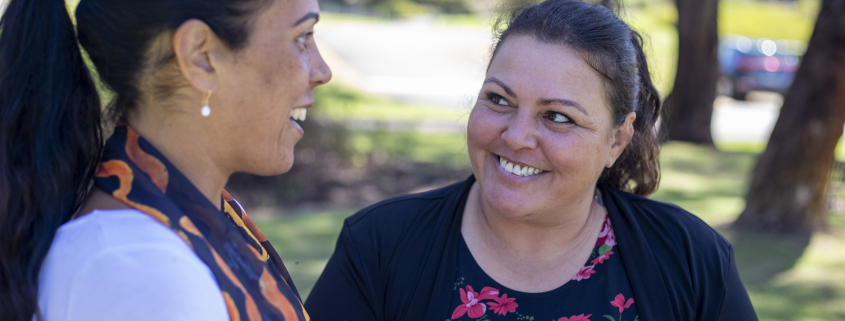The importance of role models
Think back to when you were a child. Who did you want to be? Was it your favourite footy player? A movie star or celebrity? How about one of your parents or your favourite uncle or aunt?
Everyone looked up to someone as a child, and even as adults, we still have our heroes and people who have a profound influence over us.
This article will explore role models, who they are, their importance, what good role models do and how we can be good role models to someone.
What is a role model?
Put simply, a role model is someone who serves as an example and someone who others look up to, often as someone worthy of imitation.
People have role models at all stages of their lives, but role models are usually most impressionable on children and younger people.
Despite people thinking of role models as celebrities, sports stars and other notable figures, they can also be closer to home.
Many people call one or both of their parents or carers role models, whilst teachers are often seen as role models in the eyes of students.
Why are role models important?
We don’t usually give this much thought, but role models give us our most important life lessons, with their actions having a profound influence over us.
Think back, and you’ll likely remember a time – be it good or bad – when you’ve imitated someone who you look up to, be it a sports star or similar.
The fact that role models are most impressionable on children and young people is at the very core of why they’re so important.
Positive role models influence our actions, often in the form of imitation, and motivate us to try for the standards they have set.
It’s for this reason that role models are important. A good role model can sometimes influence a child or young person even more so than parents can.
What does a good role model do?
The effects of a positive role model cannot be overstated, especially when it comes to their impact on children. Let’s take a look at some of the things a role model does.
Inspire and motivate
Role models have the passion, ability and platform to inspire generations to come, which is why most role models try to set a good example.
Children, young people and adults all face challenges, and seeing their heroes face their own challenges and bounce back can be a source of inspiration and motivation.
This is especially true for people who face forms of discrimination – be it because of a disability, their sexuality or race.
In instances such as these, role models can help to inspire faith and confidence in people to achieve their goals, despite the obstacles in their way.
For example, an athlete with disability who goes on to win a world championship will play an important role to someone with similar disability who feels they can’t achieve their goals.
Good behaviours and habits
As we’ve already mentioned, role models can help to instil good behaviours and habits in people, especially young children, who are constantly learning.
Most children look to their parents as role models, so it’s very important that parents are seen setting a good example to develop important habits in their children.
For example, if you’re with your child and you drop a piece of litter, you wouldn’t ignore it because you’d be aware that your child might follow suit.
Setting and achieving goals
Role models provide a template for success and can help people set and achieve ambitious goals, often modelling the type of behaviour required to reach their goal, even if it’s in a totally different field.
For example, a child who grows up with a parent working hard and achieving their dreams will be more likely to replicate that success.
How to be a good role model
We’ve explored what a role model is, why they’re important, what they do and now it’s time to find out how you can be a good role model.
These are just a selection of some of the things you can do to make sure you’re a strong role model for the people in your life.
Take care of yourself
Getting the basics right is always important, which is why making healthy lifestyle choices is fundamental if you want to be a good role model.
Making sure you’re getting enough exercise, eating the right foods and getting enough sleep are some of the things that go towards living a healthy lifestyle.
These might only seem small, but to a child or someone who looks up to you, they can make a huge difference and set some solid standards.
Be open about your life
Everyone makes mistakes, which is why it’s important not to hide things that you’ve done in your lifetime that you’re ashamed of.
Being open about the mistakes you’ve made and how you rectified them is an important way to teach humility to those who look up to you.
Making yourself a “perfect” role model might seem like a good idea, but it sets unrealistic goals which can feel unachievable to anyone who looks up to you.
Start early
It’s never too early to be a role model, especially if you’re a parent. Start teaching good values and leading by example from a young age.
For example, if your child hits another child, let them know that it’s not OK, explain why it’s not OK and tell them what consequences their actions could have.
Remember, it’s never too late. If you have a younger sibling with a habit of misbehaving, try to show them the right way. Role models can inspire people of all ages.
Be a good listener
Don’t feel like you have to be teaching all the time. Remember, being a good role model to your children, friends or anyone else, can mean being a good listener.
Everyone has something to say, but by considering what other people say, you can show the value of listening and learning.
What’s more, you might learn something that makes you a better role model, so it benefits you, along with those who look up to you.
Stay positive
Staying positive is an important and valuable characteristic, and one that your child or anyone who looks up to you will benefit from.
Whenever you face a challenge, try to remain positive. That doesn’t mean be unrealistic, but try to face challenges for what they are: a challenge, not the end of the world.
Keep it real
Keeping it real is important. Being a good role model means trying to be a good person and leading by example.
However, there are going to be times when you’re angry, and that’s OK too, because even role models have spells where they’re not a superhero.
As long as you deal with negative emotions and feelings in a sensible way, then there’s no reason why you shouldn’t be able to show you’re only human.
Need to talk to someone?
If you want talk to one of the Access Psych team, take a look at our registered and provisional psychologists near you.
Alternatively, if you have any questions about Access Psych and what else we can do for you, visit our Frequently Asked Questions page.
When you’re ready, you can book an appointment online, speak to one of our friendly team on 1800 277 924 or email info@accesspsych.com.au.
The information provided in this document is general in nature and is intended to be used for information purposes only. While we have tried to ensure the accuracy of the information published, no guarantee can be given that the information is free from error or omission or that it is accurate, current or complete.
The information published is not, and should not be relied on as, health or treatment advice. The diagnosis and treatment of any mental illness requires the attention of a physician or other properly qualified mental health professional. If you are seeking diagnosis or treatment of any other mental illness, you should consult a physician or mental health professional. You should not delay in seeking, or disregard, professional health advice because of something you have read in this document.








